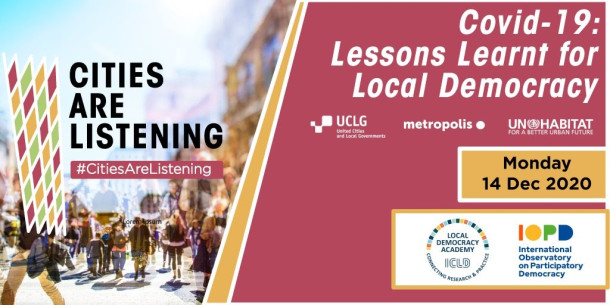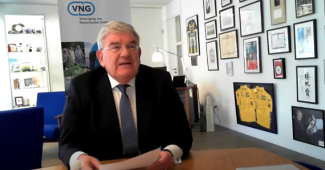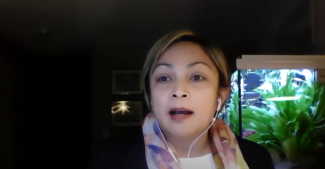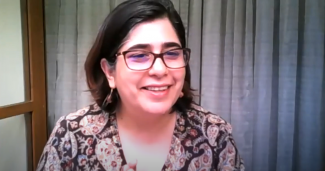
Cities Are Listening addresses the impact of Covid-19 on development cooperation and its role in reshaping local democracy
To take a closer look at how Covid-19 is having an impact on development cooperation, we need to think about how important it is from a local and regional perspective, especially considering that most of the challenges we are facing can only be tackled by working together. With this premise in mind, on 8 December we organized a new #CitiesareListening session, together with UCLG and CIB. Organising this high-level dialogue with representatives from national governments and donor organisations was especially important to ensure that funding reaches the communities that need it the most, so that we develop more resilient societies.
Over the past few months, it has become clear that the crisis caused by Covid-19 will have lasting effects all over the world, and the effects are felt hardest on a local level. As Jan van Zanen, Mayor of The Hague and Chair of the Association of Netherlands Municipalities explained: “Local recovery will need to be about building resilience, ensuring democratic principles and promoting decentralisation to ensure the viability and sustainability of local and regional governments in the future.”

Jan van Zanen
Currently, local government development cooperation is one of the key elements to tackle the challenges facing society, from climate change to social impacts and health issues.
“Many representatives from international donor organisations want to have a real conversation among different stakeholders, and this conversation is important to ensure that we agree on a joint way forward within development cooperation, and make sure development funding reaches the communities that need it most”, stated Lucy Slack, Deputy Secretary General of the Commonwealth Local Government Forum.
Achim Johannsen, Senior Policy Officer at the Division for Governance, Democracy, Rule of Law, German Federal Ministry for Economic Cooperation and Development (BMZ), highlighted three effects that go beyond the health crisis. The first one is growing inequality worldwide, which represents a huge challenge for social cohesion, and the second is digitalisation—how fast economies and societies are switching to digitalised processes—and he considers this both a challenge and an opportunity. The third effect beyond the health crisis is how municipal finances have been put under extreme pressure. He sees the need for both national stakeholders and development partners to work on solutions to improve local finance, at least during Covid-19.

Achim Johannsen
Nayoka Martinez-Bäckström, Senior Programme Specialist and Thematic Coordinator for Urban Development, Unit for Global Cooperation on Environment, Swedish International Development Cooperation Agency (Sida), explained that the experience of adjusting our way of working in response to the pandemic has highlighted the need to follow effective development cooperation principles. “In our multilateral system, we need to reach out to our partners and stakeholders and ask them what the situation is and how they can reorganise their own activities and action plans to respond to the needs of communities, within their own context [...] In this context, the 2030 Agenda has become more important for us, because investing in achieving the SDGs is also investing in our recovery from Covid-19”, she added.

Nayoka Martinez-Bäckström
Participants analysed how the crisis has had an impact on priorities within development cooperation policies and activities. Shipra Narang Suri, Head of the Urban Practices Branch, UN-Habitat, revealed that the future of development cooperation must be considered in line with these risks: “Worldwide, the focus is shifting to emergency response, protecting and saving lives, which is fine, but it has led—as we know—to centralisation in many parts of the world, and—in other parts of the world—to dumping huge responsibilities on local governments, which were already struggling before and are struggling even more now.” She also pointed out that “we are struggling to implement long-term structural recovery strategies because fiscal stimulus is not being targeted enough by local governments.”

Shipra Narang Suri
On 14 December, another session of the Cities Are Listening experience took place.
Representatives from local governments, city networks and academia shared their ideas about the role of Covid-19 in re-shaping local democracy. The speakers’ different backgrounds meant they were able to bring some of the diverse issues and opportunities that the pandemic has highlighted to the table.
Anders Knape, President of the Swedish Association of Local Authorities and Regions talked about the current overfunding of local governments in Sweden, without adequate preparation to manage that money: “Local and regional authorities can't use the money they have: they can't find more doctors and nurses! [...] And this complicates their relationship with citizens.” And in this regard, he asked: “What should be regional and what should be national?”
Besides this, James Manor, Professor Emeritus for the School of Advanced Study, University of London focused on trust as a key element that Covid-19 has highlighted across all levels of authority: “If you don’t take advantage of the knowledge that local and regional governments have, this is dangerous! [...] Local councils can encourage people to trust medical professionals.”
Bringing the session to a close, UCLG Secretary General, Emilia Saiz, brought her international vision on the work of local and regional authorities to the conversation, giving a broader understanding of the current situation, and putting the focus on citizens: “There has been a high politicisation of the crisis response. [...] The underrepresentation of vulnerable groups has been extremely visible: the spaces for dialogue and participation need to change.”

